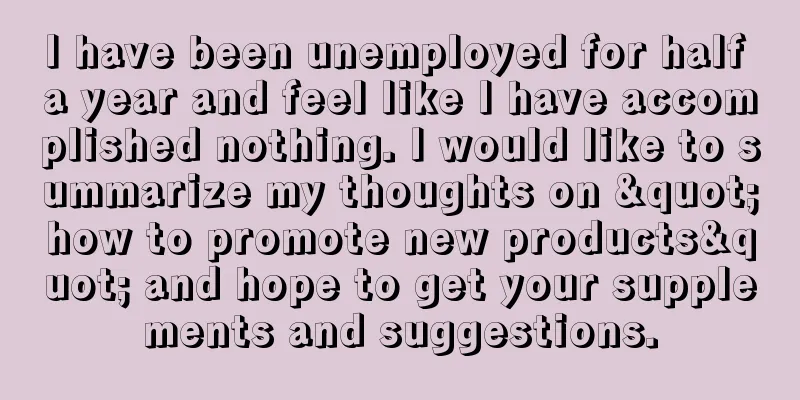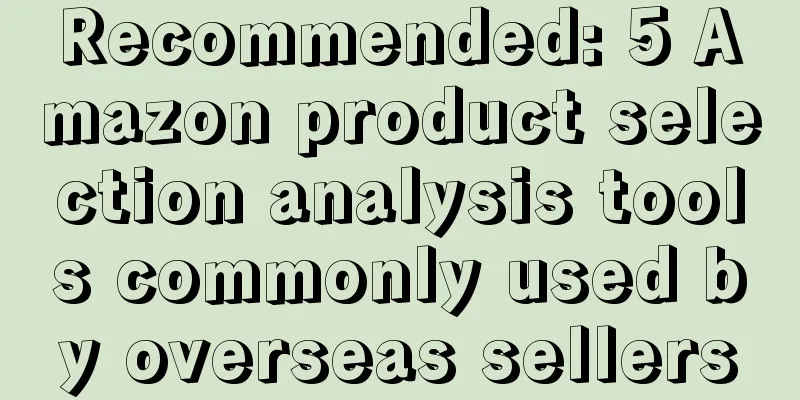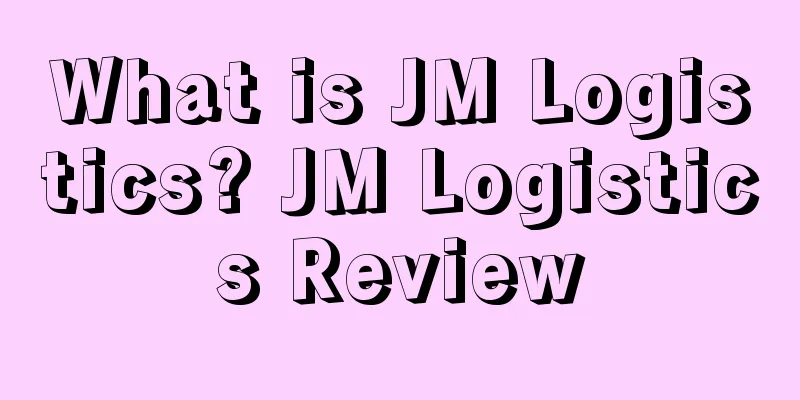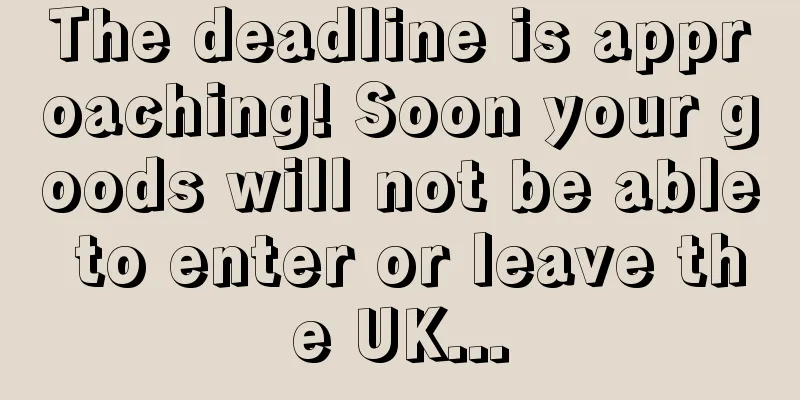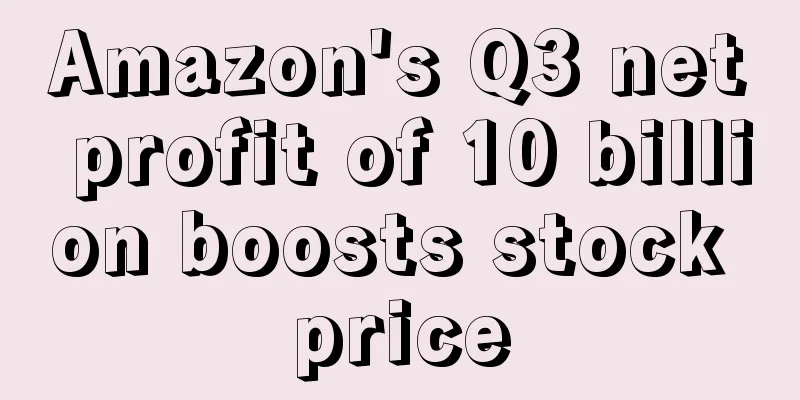|
Shiyilang and the gangster Time flies. To sum up my performance this year, it is a complete mess. I resigned due to company problems in July, looked for a job in August, started working in August, the company was dissolved in November, and I looked for a job in December. I feel like I have accomplished nothing this year. I have regrets and sadness, but more likely, I feel anxious and helpless.
Currently, Amazon FBA models include boutique and boutique. However, no matter what type of company, you will encounter the question of " how to promote new products " during the interview. I would like to summarize my thoughts and hope to get your supplements and suggestions. I hope that the New Year's gift is knowledge.
Next, we will summarize this issue from two perspectives. In fact, there is correlation and interconnection between them. For the convenience of understanding, these two aspects will be separated.
Boutique model: basic operation perspective
First, we divide the entire product life cycle into the following: (I personally think that it is not possible to use actual dates as stage standards, such as one month or two months. I hope everyone can give their own insights on product stages.)
This is just preliminary research work.
The product enters the new product list or before the first stage goal is achieved Product/project investment phase
The product leaves the new product list normally (this does not mean that the order volume drops out of the new product list) or the first bottleneck occurs The product/project has reached the break-even stage within the site
The product has achieved the expected order volume and ranking The product/project enters the stage of sustained profitability
1. Product promotion preparation stage:
1. Be familiar with and understand the product, clarify the basic situation of the product and determine the applicable traffic type (precise or extensive) based on product packaging, size, weight, color, material, FBA delivery fee, packing quantity, production cycle, cost structure, category positioning, etc.;
2. Be familiar with and understand the traffic trends under the market analysis category , collect the prices of products on the market, estimate sales, monopoly and the number of self-operated brands, summarize the user pain points of similar products, user base, category average return rate, average conversion rate, and have a basic understanding of the order volume and corresponding ranking (estimate);
3. Build a product keyword database, find the core keywords of the product, download keyword rankings and keyword traffic trends through ABA tools, check the core keywords included in the competitor's products through ERP or Amazon search box, and divide the keywords into levels according to the size of traffic and accuracy. At the same time, make a basic estimate of the CPC of the keywords, and understand the keyword search conversion rate, purchase driving factors, etc. through the business opportunity detector;
4. Identify the competing products and conduct an in-depth analysis of the promotion methods of the top competing products in the category (link price trend, ranking trend, number of keywords included in the listing and distribution of included keywords, whether it is an off-site order, whether the sub-entities are merged, whether the products are updated, etc.), continue to pay attention to the new product list links, promotion price, review trend, QA trend, A+ layout, keyword inclusion, ranking fluctuation, and find suitable targets for the two types of competing products
5. Write listings, write scripts for product pictures, buyer shows, A+, etc., design pictures in a targeted manner according to user groups and product features, explain in detail how to solve user pain points through videos or pictures, keep the copywriting consistent with the picture content, and make basic positioning of the picture style of the details page in combination with the picture style of competing products, and determine the price based on cost and profit;
6. Shipping stocking plan: Confirm the labels in advance, determine the initial shipment quantity, and make a reasonable stocking plan based on the factory production cycle and delivery cycle;
7. Develop targeted product promotion plans based on the company or department’s tasks.
2. Initial stage of product promotion
- Test the usage rate of product coupons and adjust the pricing model based on actual conditions;
- Develop a review plan (vine, merge old links, urge reviews) and link base optimization: buyer show, advanced A+, etc.
- Promote according to the keyword library plan - formulate detailed delivery plan advertising structure - hierarchical distribution - budget distribution - delivery target or delivery position, and select appropriate keywords to obtain sufficient traffic based on the initial promotion cost and stage goals;
- Updates to the brand’s flagship store;
- Conduct buyer interaction and brand-customized promotions to attract old customers to return;
- New product post release;
Continue to pay attention to product advertising data, reviews, order fluctuations, inventory, etc.
3. Mid-term product promotion
4. Late stage of product promotion
Boutique model: project operation perspective
This is the first time I think about the operation problem from the perspective of a project. There are many deficiencies and points that need to be supplemented. I hope to get your help. If we think about the issue of how to promote new products from a different perspective:
How to promote new products = How to make a project successful = How to judge the success rate of a project = The conditions required for product/project success
First, we need to think about the definition of "success":
A. Product data looks good, ranking high, and sales volume is high;
B. The product just needs to have a certain profit.
If the needs and goals are different, the corresponding operating rhythm and demand conditions will also be different.
1. Products
Supply chain: Determine whether the supply chain has an absolute advantage based on the factory's production quality, stocking cycle, production cycle, and delivery cycle; Supply and demand: In addition to understanding the market demand and supply relationship, it is also necessary to judge the market monopoly and own competitiveness Transportation: transportation timeliness, ability and timeliness to handle temporary problems, transportation costs, transportation channels for special items Cost: whether you can access the raw material supply, product production price, packaging price Differentiation: Whether it has the ability to improve user pain points, not just basic differences in appearance
2. Operation On-site operation: the logic and rationality of the operation itself. Off-site resources: off-site celebrity resources and off-site traffic channels. Breaking through traffic barriers: technologies to be supplemented Build brand advantage: To be supplemented Product moat building: building intellectual property rights, applying for copyright and appearance patents, etc., to ensure basic product safety Does the operation have a sense of feedback? Develop and iterate the product reasonably to ensure the product is leading in the category.
ROI Practical goal or plan setting
Investment: The budget spent on the entire product promotion phase
Investment time: How long does it take for a product to break even from the investment period, how long does it take from break even to profitability, and the profit growth/sustained profit cycle
Product iteration: Expand new products on profitable links to ensure sustainable development of links
a. Risk points that may easily lead to failure: Excess inventory Cash flow break The store was closed Links spoofed Too many product quality issues, not enough review stars Iteration is too fast and seasonality is strong
We welcome additional comments on objective and controllable risk points. b. Worst case loss of failure c. How to reduce losses or lower the probability of losses
Because I have never done the fine paving model, but I still want to talk about my basic understanding and views.
In my opinion, precision shopping should be centered on profit, and more emphasis should be placed on the development of product categories and styles, the control of the operating rhythm, the control of advertising investment and the balance of order quantity, and the decomposition of target tasks to achieve qualitative change through quantitative change.
The preparation work for new products should be as meticulous as that for high-quality products. In terms of advertising, the highest CPC should be calculated based on conversion rate and profit, and appropriate keywords should be selected for SP advertising, or advertising in the form of leak-picking ads. In fact, my understanding is very superficial, and I hope that the masters of high-quality advertising can provide in-depth guidance. This model is the model of many entrepreneurial peers, so there will be many predecessors.
I am thinking, summarizing, and reflecting. I know that product promotion is not something that can be achieved by hard work. I also know that the points of the summary are things that many people know, but in these days of unemployment, I always want to do something and always want to learn something. I have thought about doing it myself, but thinking about my own conditions, it seems that there is no cost of trial and error, and I can never muster up the courage to take the first step. So is responsibility good or bad? Is burning your boats selfish or brave?
If life deceives me, I will still be like a dog, looking forward to your occasional favor to me. Learn to accept everything that happens, whether it is good or bad. After all, success is temporary, growth is eternal, and failure is the main theme of life.
"Wonderful Reply"
Anonymous user Agree with: AXiing, Puss in Boots, LY, Orz I have a deep understanding of the poster's experience, work summary, and self-reflection after losing his job. If you agree, please share your own experience and feelings.
After the New Year of 2022, I worked in an industry and trade precision category operation company. My performance and ability improvement were very good. However, I left due to the change of commission system and the refusal of salary increase. From then on, I started to wander around.
After leaving the company after 3 years, I had to endure a lot of hardship because of the previous performance. I often slept in the middle of the night. I had to work all night for flash sales or major holidays, which caused me great mental stress. I took a break for more than a month before I continued to work.
I just came back to work and I applied for many companies. After about half a month, I finally chose a company that was transforming from a boutique store to a boutique. At that time, I had a very good talk with the boss and the supervisor. They made all kinds of promises. Of course, I could hear some of them, but the real pit began. This company squeezed more than 10,000 products of various categories in its overseas warehouses, and shipped these products back to the corresponding stores to make new links. This is called pushing new products. Can you believe it?
At the beginning, I thought I would definitely be better than the previous operators and would achieve good results. I did a good job in promoting the products I got in the beginning, including seasonal and regular products. Then homogeneous products popped up, which were exactly the same as ours but priced much lower than ours. We collapsed all of a sudden, and I couldn't complain or anything. The company relies on S orders to promote products, and my advertising's overall acos and share are the best in the company. Due to the influence of homogeneous products, the overall performance was not good and the advertising gradually deteriorated. The problem was attributed to me, saying that I was incompetent. Then I was not given the core factory-limited products and was asked to stay there. Then they found a reason to fire me.
After I finished this job, it was almost the National Day, so I came back to my current company after the holiday. The interview was completely different from the actual company situation. The commission, operating costs, turnover rate, etc. were all fake. The HR who brought me in swore that the turnover rate here was very low and I shouldn't worry. But he left after half a month. The most important thing was the expense part. The interviewer here told me that the net gross profit was about 3%, which is the normal operating and promotion costs, those product costs, and the upfront cost, everyone understands. As a result, the SB, department mold opening costs, and rendering costs were shared later (the company's in-house design costs, shocked). When I asked the reason, the finance department replied that it was approved by the responsible persons a long time ago.
The first month I took over the product, the net profit was negative 30,000 yuan, and the second month I made more than 6,000 yuan, but the average cost was negative, and I laughed. The average cost was more than 20,000 yuan, and if the hourly amount increased later, it would be more. I saw that the top salesman only got 5,000 or 6,000 yuan in commission, and I saw everything, it was just a blood steamed bun.
My friends and family always ask me why I don’t choose a company carefully, why don’t I ask clearly, and why don’t I leave early if it’s not a suitable one.
Reasons for not leaving:
1. For various reasons, I really don’t have money. I have to work to earn money. If I rashly start or leave a job, the time and money costs will be high.
2. Personally, if I join a company, even if I find it not good, I am not the type of person who will just leave. I will give it a try and see if I have a chance to make achievements before deciding whether to leave or not. Maybe I am a bit paranoid.
3. I get anxious very easily. If I spend a long time looking for a job, I will easily lose sleep and become emotionally unstable. I am the one who pays for the main expenses of my family, girlfriend, etc., as well as the future plans.
I definitely have no problem with my ability and requirements for work. After all, I have achievements to prove it, and I am doing OK now. But ability really determines the lower limit, and opportunity is the upper limit. During the peak season, a friend of mine who is familiar with me switched from a boutique store to a boutique store. She has been doing this for more than half a year. I have taught her advertising several times. She is still very ignorant at present, but she received 40,000 to 50,000 commissions in the three months of the peak season and is preparing to go home for the New Year. However, all the profits I made were deducted. Although the basic salary is not bad, it really makes me feel lost and powerless. I don’t know how to get on the right path. Yog aga • United States I can see that you are very capable, but like the original poster, you haven't met the right company. This is how the world is. The right one can only be met after many twists and turns, sooner or later. In fact, you can also compare several companies during the interview, or check the pitfalls of the company on the neighboring website to see which ones you can accept.
Anonymous user
Agree with: Morven, Humble Little Xie Working Online, xuezhi, Queen's One O'Clock, 347633499 More » I hope I won't get scolded for saying something off topic. I really hate the idea-based questions like how to promote new products in interviews. Usually most interviewers only give one-way input to this question, without any output or interactive discussion. For the interviewee, it is just a one-way explanation and one-way output, without any effective input.
Regarding this kind of unequal interview, I personally think that most companies that ask this question are testing their experience. In my narrow-minded opinion, a company that asks this question is not a company that is particularly experienced in new product promotions, nor is it a company that has a relatively high success rate in new product promotions. Such companies are usually smaller in scale.
Personally, I think the interviewer can ask questions about a specific aspect of the interviewee's new product promotion. This will be more targeted, easier for people to accept, and easier to improve the interviewer's interview efficiency than the seemingly specific but actually general questions about how to promote a new product.
For the interviewee, assuming that the problem of new product promotion can be solved completely throughout the entire process, it may be that the interviewee has unique operational ideas, or the interviewee has advantageous resources. If the interviewee solves the problems of supply chain and funds, he can actually start his own business independently, and the success rate may not be low.
Back to the poster's sharing, I feel that what the poster said is very detailed and comprehensive. I want to talk about the issue of category familiarity and stage grasp. It's just my personal opinion, please don't criticize if it's wrong.
The success rate of new product promotion is closely related to the familiarity with the category. If you are familiar with the category, you will be more confident about the profit model of a product, including locking in competitors, determining product advantages, and controlling each promotion stage.
Regarding the product promotion preparation stage mentioned by the poster, it feels more like product selection. Regarding product selection, it involves cross-category selection and product selection within the same or similar categories as well as upstream and downstream of the category. Product selection within the same category is undoubtedly the most familiar. Choosing the right product will make the progress of each stage more certain. If it is cross-category product selection, the process may be the same, but the results are different, which is more due to the lack of understanding of the product. In-depth understanding of the product requires not only increased learning intensity, but also a certain amount of time accumulation. The fan does not shake its head • Shenzhen Most of it depends on whether your own thinking is clear. Do you think you have the ability to let others borrow your experience? Most people say it very superficially, just going through a process. Whether it is a plus point depends on the individual.
Anonymous user • Qingdao @扇不抖: It is true that the interviewer and the interviewee are in different positions and have different perspectives. There is no right or wrong. It is just that the interviewee may not have a very superficial understanding of this question, but just speaks very superficially. It is just an interview. Is it necessary to reveal everything? All roads lead to Rome, and the same is true for promoting new products. Is there any right or wrong? Actually, there is no right or wrong. The point of using experience is purely my personal understanding. I personally express my disgust, that's all.
Enjoy the warm breeze • Shenzhen There are too many companies now, which leads to a mixed bag of good and bad companies. The Amazon environment has been greatly deteriorated due to the miscellaneous companies. Many companies that have been recruiting for many years are just like what the OP said. The two or three hours of interviews are all to get your experience and ideas. Then you talk a lot, and I don’t know whether it is because of your own reasons or because the company doesn’t need you, you didn’t pass the interview. This results in the failure to correctly match your strength, but instead hits the old operations. Then, when asked about promotion ideas and new product strategies during the interview, they don’t mention them at all. Because there are too many such companies, I’m tired of answering them. They are all miscellaneous experiences in creating hot products. Therefore, in the later interviews, you must determine the scale of the company before going for the interview, otherwise it will only be a waste of time or talking to a cow, and trying to trick you into thinking about promotion ideas.
December the BS • Shenzhen I often wonder how much of the experience (especially in different categories) brought by the previous company can be applied to the next company's products? Every company has its own style, and no company will completely let the operation do what it wants. If the established methods are applied to the new standards, can they play the original effect?
A mortal who wants to be a boss I will talk about my views from four aspects of rapid promotion of new products:
First, data analysis. Before promoting a product, we must conduct a complete set of data analysis on the category to determine the product's price range, selling points and main keywords. In particular, it is recommended that you give priority to keywords. Small keywords that can grab traffic do not necessarily have to be given priority to big keywords.
Second, the copywriting, which consists of three parts: price, selling point and keywords. Let’s talk about price first. When setting the price, we must lock in a price that is different from other links in the category. According to the shelf principle algorithm, this operation can get more exposure.
If the price is the same, our link is very likely to form a strong correlation with other old links, fighting each other, resulting in our link not being able to grab traffic, or even failing to make orders. In the early stage of a new product, the number and quality of comments on our link must not be as good as those of the old links, so in terms of the selling points of the product, we must have our own characteristics, and highlight these special selling points, put them in the five points of the title and the pictures, and use product differentiation and personalization to enhance attractiveness.
Third, comments. Before advertising, we must plan comments in advance, because if new products do not have comments to support them, and if we open advertising links too much, the data will most likely be very bad. As for the early stage, how many comments are needed to stabilize the click-through rate and conversion rate of the link? We can observe the number of products of competitors in the same category and price range in the early stage of new products to determine the number of comments we need in the early stage. If our products are easy to use and of good quality, we recommend everyone to do the Viine voice plan.
Fourth, advertising promotion . After the first three steps, our keywords have been basically selected. However, for most categories, it is recommended that you start with small keywords first. When the orders for small keywords are stable and the rankings continue to rise, we can then use big keywords. In the new product period, we need to quickly accumulate orders with comments. If we use big keywords first in the early stage without sufficient comment support, the data will be very poor. Even if we spend a lot of money on promotion in the early stage, the conversion rate will be very low.
yikeshu - never stop learning, never stop talking! Agree from: StephenCurry, KristenZhanWai, lucia7788, Yishengyi Nian, HansHuang More » Basically, I have already thought about what I should think about. If I have to say something else, it is probably to look at this issue from the perspective of an investor or a boss. When launching a new project, should we first consider long-term development or short-term benefits, the size of capital investment, the payback period, the intangible cost of time, and the limits of the team's capabilities? To make short-term profits, it is the same as your idea, which is a matter of implementing the details.
If you want to build a brand and develop in the long term, this idea is still not enough. After the initial research is completed, the size of this category must be large and there must be room for entry. The corresponding supply chain and products must also be strong, and the stocking must be large. What you want is not profit, but market share and brand exposure. These early links may be wiped out, but as long as one performs well, it will be considered a success!
The above may not be something that individual entrepreneurs can afford, but entrepreneurship is not the only way. Operation is a skill, not a job. It is especially important to keep improving yourself and thinking about this job. Only when you are strong enough, the success rate of entrepreneurship will naturally increase. Individuals are the best investment!
Just a Clown - Unity of Knowledge and Action, Cultivation of Both Body and Soul Agree with: Luohualangjue, Li Siting is here, everyone get out of the way, Tito123 more » There is nothing to add, the boss has already said it very comprehensively. Objectively speaking, I think the poster's overall view is not off the mark. The poster's difficulty in finding a job this year should be a matter of timing rather than ability.
July and August are the time of Amazon's autumn promotion, and the best time to join a new project has been missed. In fact, it is better to find a job at the beginning of the year, because both new and old companies start to build new products at the beginning of the year and are short of people. The poster can relax and do some research on the company background or sort out his career plan. He can learn some communication skills for interviews. I don't think there is anything wrong with the poster's professional skills and thinking framework. He simply didn't find a company that matched the supply and demand.
A member of the masses Agree from: Kristen站Wai, Momoli, rainco, Yishengyi Nian, Li Jianhao more» To be honest, many operators can understand and do the above. It is nothing more than two major parts, traffic and conversion. Traffic is very simple, on-site + off-site, just spend money. Conversion is the most critical part. How to effectively improve conversion and maintain it, whoever can solve this problem will be the winner. Chuan Chuan Er Liu • Shanghai This statement makes sense, but it is also a completely wrong view.
'Traffic' and 'conversion' are closely related. Talking about conversion without keywords is just increasing traffic.
You think traffic is simple because you only think that traffic is exposure and clicks.
But those who really play with traffic all focus on keyword conversion and transaction.
The effective improvement of conversion you mentioned is not difficult for real operations, but it will refine the conversion to every link of the product. I will not describe it in detail, but start with an example of product selection: create differentiation for special keyword traffic depressions and avoid big words. This will effectively improve conversion.
Anonymous user Agree with: wangsh36, Xiao Ningzi in Forest, Morven, Humble Xiao Xie working online, Hu Shuo Ba Dao More » Hey, after reading it, I feel like, is there anyone like me who has worked on Amazon for many years and has successfully launched many products? However, it seems that it was all due to luck. When I see others talking so well, I feel like a fool. Enjoy the warm breeze • Shenzhen Don't underestimate yourself, luck is a manifestation of strength. The extent of one's ability can only be reflected through work results, not through words.
|
